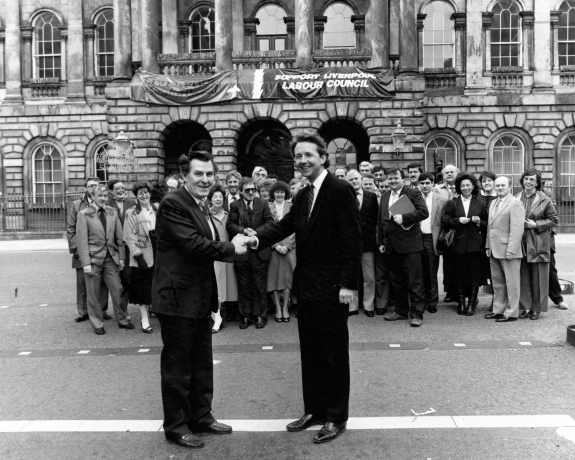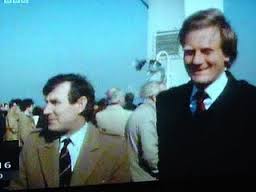BARMY road schemes are not new in Liverpool, they were happening years ago.
And so it was that the path to political stardom for Sir Trevor Jones started with a plan that would have carved its way through inner-city Liverpool - and wrecked his business.
When a scheme was drawn up in the 1960s to extend the M62 to the waterfront, turning Upper Parliament Street into a motorway, Trevor Jones realised his Wapping premises stood in the way of “progress”.
He fought the project, which was eventually abandoned, but it became a baptism in politics for a man who would go on to earn national and international recognition as “Jones the Vote”.
His put-downs to opponents were not the vicious nastiness that we see all too often today but a witty quip that totally demolished them
Trevor Jones’s Welshness meant that title was as cherished as much, if not more, than the knighthood bestowed on him by the Queen for services to politics.
His arrival on the Liverpool civic scene, in 1966, came at a time when the then Liberal Party was virtually non-existent in the city.
Cyril Carr was the party’s sole flag-waver in the corporation chamber, but somehow, after Jones joined up, the party went from strength to strength, eventually easing the grip on Labour’s domination. The Liberals took control in 1973.
In those days the Conservatives, now totally extinct in Liverpool, were also a force to be reckoned with.
But Sir T came up with pavement politics, fighting issues that struck at the heart of local communities. Things like broken street lamps: issues small in the scale of things, but large for those affected.
A few motley mattresses, dumped in back alleyways, featured in the Jones campaign trail, propelling the party forwards.
 Trevor Jones and David Alton with the newly elected Lib Dem councillors who won back control of Liverpool in 1987 from Militant
Trevor Jones and David Alton with the newly elected Lib Dem councillors who won back control of Liverpool in 1987 from MilitantAs Richard Kemp, the current Lib Dem leader in Liverpool, put it, Trevor Jones saved the party from a near death experience in the 1970 general election.
He took his distinctive campaigning style onto the national stage, organising, in 1972, the successful Sutton and Cheam by-election.
He would become leader of the city council, national president of the Liberal Party and although he never made the migration from local to national politics, he was regarded as a political elder statesman.
He was a mentor of David Alton, his deputy and one of the country’s youngest councillors. In 1979 Jones guided him to Westminster by helping him win the Parliamentary seat for Edge Hill, following the death of Labour MP Sir Arthur Irvine, with 64 percent of the vote. The swing from Labour to the Liberals, of 36 percent, was the biggest ever recorded.
After the Toxeth riots he played a part in bringing Michael Heseltine to Liverpool, kickstarting a renaissance that continues to this day.
Born in 1926, Trevor Jones was brought up in Bootle and, as a teenager, joined the Merchant Navy seeing war time action in the Atlantic Convoys, at Aden, Singapore and elsewhere.
After the Second World War he returned to Liverpool and, with Doreen, his wife of 65 years, became a successful businessman, running Joseph Lamb’s ship's chandlers company.
He was as happy making deliveries in his Morris Minor van as he was rubbing shoulders with political heavyweights and the rich and famous. He was a close friend of the late Duke of Westminster and was on first name terms with Mohammed Al Fayed, owner of Harrods.
 1981 and Sir Trevor shows of his knighthood with, David Alton, Lady Do and David Steele
1981 and Sir Trevor shows of his knighthood with, David Alton, Lady Do and David Steele
When Jones sold his waterfront property he was said to be concerned about the traditional sailmakers who worked from his premises. He set them up in business elsewhere to ensure they continued.
Even when he took a back seat from politics at the town hall, he retained his interest in civic affairs. When Lord Mike Storey was leader of the city council from 1998, Trevor Jones was a close adviser.
He was a member of a “kitchen cabinet” group known as G5, a group of Lib Dem seniors who mulled over proposals and ideas before they hit the public domain.
His home in Queens Drive, Childwall, boasted an impressive wine cellar, but he moved from the leafy suburb to an apartment at Waterloo Dock, perhaps returning to the waterfront that had been his lifeblood.
With Lady Doreen at his side, the Joneses were the nearest Liverpool has got to political royalty.
Lady D was persuaded to help the cause by standing for a council seat in Old Swan, believing that as a paper candidate she stood little chance of winning. She won. She took the ward and its people to her heart, standing side by side with them for 10 days as they blocked busy Prescot Road following a spate of accidents, and she marched alongside the same mothers as they headed for the town hall to try to save their public wash-house from closure.
 Trevor Jones with Michael Heseltine after the Toxteth riots.
Trevor Jones with Michael Heseltine after the Toxteth riots. Lady Doreen was arrested for her part in the road protest. She refused to plead guilty to wilful obstruction “because to me the council was guilty by not doing anything”. She was fined £5 which gave her a criminal record, but at least the residents got their road crossing. When she refused to pay it, hubby Trevor, a magistrate in another court, saved his wife from a spell behind bars by stumping up the penalty.
After the explusion from office of the 47 surcharged Liverpool Labour councillors, Sir Trevor became leader. He restored the mayoralty, scrapped during the so-called Militant rule, and Lady Doreen became the Lord Mayor. The couple, in the civic horse drawn carriage, arrived to re-open St George’s Hall, closed three years earlier during the days when Liverpool was at war with the Thatcher government and regarded as the “people’s republic”.
Richard Kemp said: “He was an inspiration to a generation (and more) of Liberal and then Liberal Democrat activists. He was awarded a knighthood - and the title which he loved most, 'Jones the Vote' - after leading campaigns throughout the Country including by-election wins in Sutton, Berwick, Ripon and Isle of Ely. I well remember him making his presidential address at the Liberal Assembly and telling us how he loved those votes!
“I have so many stories I could tell of him, his manner in the council and his generosity of spirit. Without a doubt he was the outstanding council leader of his generation. His put-downs to opponents were not the vicious nastiness that we see all too often today but a witty quip that totally demolished them. I recall one particularly tedious and raucous lady councillor being stopped in her tracks by Trevor standing up and enquiring sadly, “Have you ever thought of selling Echos?"

Lord David Alton added: “Trevor Jones joined the Merchant Navy and served in the dangerous Atlantic convoys and in other trouble spots around the world. Back on dry land he started his chandlers business. Having risked the hell of German U-boats in the Atlantic, taking on Liverpool Corporation over a controversial road scheme was a doddle.
“He led by example, always staying close to the people, fearless in opposing Militant, consistently arguing for the city and its needs. Liverpool has lost a formidable champion and those of us who knew him well have lost a good friend.”
Lord Steel, who as David Steel was the last leader of the Liberal Party, said: “Trevor gave outstanding service to his city and his party. His role as President and his electoral skills will always be remembered by Liberals.”
*Sir Trevor Jones, born December 17, 1926, died, aged 89, on September 8, 2016, in hospital in Chester after a recent diagnosis of cancer. He leaves wife Doreen, two children, Glyn and Louise, and three grandchildren.
His funeral will take place on Friday September 23, 11am, at the Liverpool Parish Church of Our Lady and St.Nicholas which has been closely associated with Liverpool maritime life since the 13th century.
Lady Doreen and the family may be written to at Rock Cottage, High Street, Tattenhall, Chester, CH3 9PX










